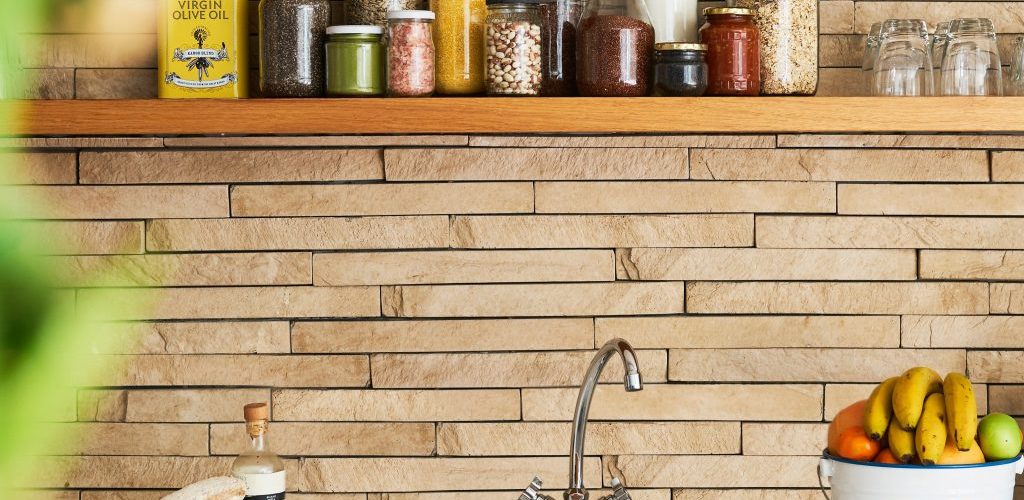If you have landed here, I am sure you are one of those who are looking to make their home and kitchen environment-friendly.
These eco-friendly kitchen ideas are budget-friendly, easy to adopt, and at the same time will reduce your carbon footprint.
1. Make a Grocery List on Old Papers
Let us start with the simple task of writing a grocery list, which many of us have the habit of doing. Instead of a fancy notepad, use some scrap paper, the back of the printed paper, or other rough paper. You can collect these bits of paper and tie them together to make your own notebook. A little saving of paper will mean little less cutting trees.
If you have any waste paper lying around, pick it up and make a note of these ideas as well and you can stick it to your fridge.
2. Use a Reusable Bag for Grocery Shopping
Many of us would already be doing it, but considering this is a list of eco-friendly kitchen ideas, therefore it is important to mention it.
In addition, if you are thinking to buy one, you can consider getting a jute bag for shopping instead of a cotton one. Jute is less water-intensive than cotton and is much more affordable and durable.
3. Earthen Cookware
In case you want to have an extra pot in your kitchen, cookware made with clay can be a good substitute for a metal one, provided it is available in your neighborhood. Having said that clay vessels will not be long-lasting and you have to dispose of them after a few use.
Making metal vessels like steel, copper, and aluminum, requires mining and other resource-intensive processes. The advantage of using a clay vessel is that it will go back to Earth from where it came from after its use, ready to be crafted again.
Moreover, clay vessels are not made by a big corporation, so when you buy them, you also help local craftsmen.
4. Glass Containers for Storage
Glass is a sustainable, fully recyclable material that provides great benefits not only for the environment but also by making your lifestyle comfortable. Here are a few advantages that help you ditch your plastic containers in favor of glass containers.
- Food does not chemically react to glass containers.
- The transparency of the glass helps you to view the content clearly.
- The glass is 100 percent recyclable and can be recycled with no loss of quality.
- Looks smart and pleasing in the kitchen cabinet.
To make this even more eco-friendly, use the glass containers that you got from previous purchases of jam, sauce, honey, etc.
5. Kitchen tools made with Wood
There are many instruments and tools we use in the kitchen. To make the kitchen environment friendly we can use the ones that are made with wood. Some of the wooden tools that you can use our – a chopping board, cooking spoon, spatula, cleaning brush, etc.
6. Reusable Cloth
To clean your kitchen counters, instead of using paper towels that can cause so much unnecessary paper waste, you can easily replace them with any old cloths or towels lying around and wash them after use.
7. Pressure Cooking
Compared to regular saucepan cooking, cooking in a pressure cooker allows you to save energy, lower your gas bills and reduce carbon emissions.
Though we have included this in the list of eco-friendly kitchen ideas, however, we would like to recommend that not all dishes should be cooked using a pressure cooker. For example, green vegetables should be cooked in a saucepan as that is better from a nutritional perspective.
8. Kitchen Garden
If you want to reduce your dependency on supermarkets and grocery shopping, you can try growing some vegetables it in your kitchen garden. By doing so, you will not only save money but will enjoy fresh and organic food straight from the plant.
If you do not have a big garden or space, you can also grow them in small pots on your balcony, terrace, or any outside place available. Some of the vegetables that can be easily grown are –
- Tomatoes
- Chilies
- Cucumber
- Spinach
- Raddish
- Capsicum
- Bitter Gourd
- Coriander/parsley
9. Food Composting
First and foremost, we should ensure to not waste any food, which we have cooked or bought. However, any food items like vegetable and fruit peels, spoilt stems, discarded leaves, and leftovers can be composted.
Make sure to separate your organic waste from other kinds of garbage before composting. The compost can be used as manure in your kitchen garden, and if any extra is left that can be given to a friend, or used in a public garden.
10. Plant-based Diet
As much as possible, we should include plant-based food in our diet. Eating fruits and raw vegetables can give you the most enzymes, vitamins, and minerals needed for good health.
In case you cannot live without your non-vegetarian food options, it will be a nice idea to reduce your meat consumption or include mock meat food options which are available at most supermarkets and online stores.
11. Locally Sourced & Seasonal Vegetables
One of the easiest eco-friendly kitchen ideas is to always buy and eat locally grown fruits and vegetables. Any product if it is brought from a far-away region or country, would have to be transported which leads to carbon emissions. Whereas getting fruits and vegetables that are grown in your region has the following benefits.
- It helps the local economy.
- It doesn’t have to travel long distances and be stored in temperature-controlled appliances.
- It is generally devoid of chemicals (which are required in the case of stored products to keep them fresh in their long-distance travel, and packaging)
12. Include Millets in your Diet
Millets are not only extremely healthy and nutritious, but they are great for ecology. Unlike rice and wheat, they need much less water, can be grown in harsh conditions, nourishes the soil, and do not need pesticides. The humble crop has emerged as a solution to food security as well.
Millets might not be available in all countries and region, in case it is available in yours, have them included as part of your diet.
13. Use Plant-based Milk
Like meat, dairy milk is also not very environmentally friendly for a variety of reasons, including the water that is used for animal consumption, animal cleaning, water that is needed for growing their food, cleaning manure, etc.
Consuming plant-based milk is also an eco-friendly kitchen idea to lower your environmental impact. There are many plant-based milk choices available in the market, like the ones made with soy, cashew, almond, oats, etc.
14. Buy Food that you will certainly eat
Whether it is our perishable food products or packaged food products, we must ensure that we buy the items that we are willing to consume before they get spoilt or expired.
Sometimes to save time or the attraction of discounts, we buy many food products in bulk that we are not able to consume and thus have to be thrown away.
15. Cook Food that you will consume
Apart from buying products that we can consume while cooking we should not cook food that we cannot eat.
16. Watch out for the Expiry Date of Food Products
Throwing food products due to their expiry remains one of the biggest reasons for food wastage. Therefore make sure that you check the expiry date of packaged food products like ready-to-cook food packets, sauces, chocolates and cookies, bakery items, dressings, etc, and consume them before they reach their expiry date.
17. Buy Food Products that come in Sustainable Containers
Whenever buying food products try to buy the ones which are packaged in glass containers, cardboard boxes, or another sustainable packaging.
Now many cities have zero-waste stores and refillable outlets, which allows consumers to carry their own containers for buying the product. This means you are effectively getting the product and not the packaging.
18. Collect water from Water Purifiers
The reverse osmosis system in many home water purification products wastes a lot of water.
If you have a water purifier system that discharges water, try to collect it in a tank and use it in the garden or for toilet usage.
19. Avoid Plastic Cling Wraps
Another small eco-friendly kitchen idea is to use a cloth cover or a reusable lid to seal/cover/secure food items instead of plastic cling wraps.
20. Metal or Glass Tiffin Box
If you carry lunch boxes to your workplace or school, avoid using plastic tiffin boxes and switch to ones that are made of glass or steel.
21. Unplug the Electrical Appliance
A kitchen can’t be complete without a variety of electrical appliances like a juicer, mixer, blender, toaster, air fryer, oven, kettle, etc. Many of these modern devices drain energy even when turned off even if they are energy-efficient. Therefore when the use of the device is complete, unplugging them after every use is a good habit to save energy and reduce your carbon footprint.
Wrapping Up
Hope you liked this list of eco-friendly kitchen ideas. If you have any other tips or suggestions, you can add it in the comment, we would like to include them as and when we update the article.
As you would have noticed many of these tips can be followed without spending any money. By making minor changes in our lifestyle we can make a considerable impact on the environment.
You can follow us on our Instagram or other social media handles.






Add comment